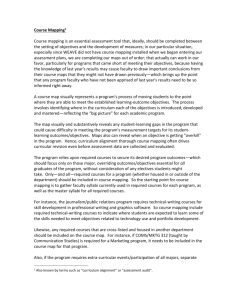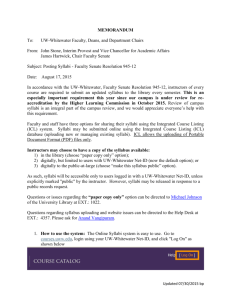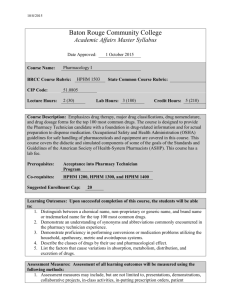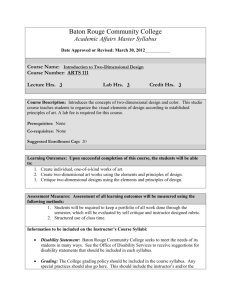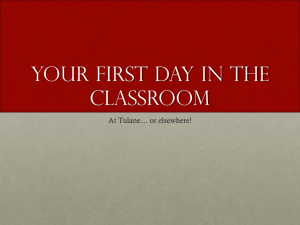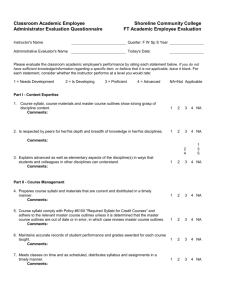here - Loyola University Chicago
advertisement
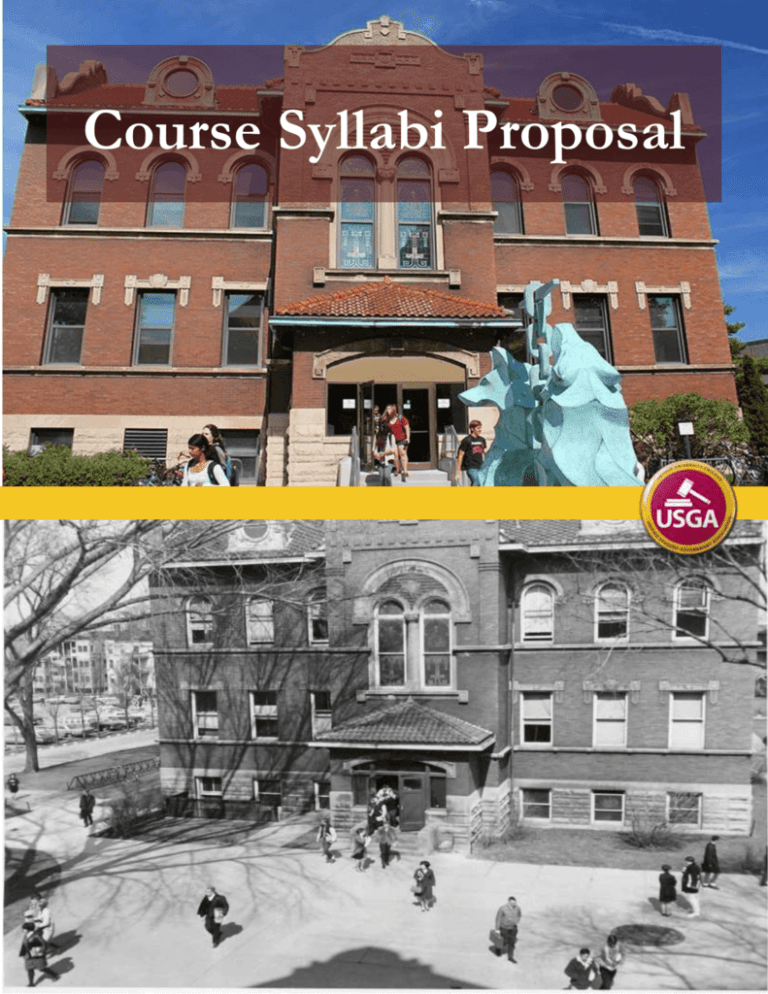
Course Syllabi Proposal CONTENTS Jesuit Mission…………………………………..………3 Syllabi Proposal Defined…………………...…....4 Research………………………………………………....5 Objectives……………………………………………….10 Works Cited…………………………………………….11 2 “Commitment to excellence: Applying well-learned lessons and skills to achieve new ideas, better solutions and vital answers.” This quotation is one of the five characteristics of a Jesuit education listed in The Student Promise. Page five of Loyola’s Transformative Education in The Jesuit Tradition states: “A Jesuit education seeks to address the world in which we actually live as well as the hopes and challenges of that world…students today appreciate having so much information at their fingertips, and yet, they long for a more robust formation that integrates their intellectual, affective and volitional capacities and helps them to appreciate how the varied subjects and disciplines fit together.” Each of those statements outlines the importance of quality education at Loyola University Chicago. In The Student Promise, the phrase “welllearned” is used, implying that Loyola as a university strives to teach students in a way that is relevant to the rest of their lives. Instead of simply listening to information and reiterating it on exams and in papers, the promise of well-learned lessons and skills alludes that students will be able to apply the information they learn to their daily lives. The quote from “Loyola’s Transformative Education,” emphasizes the uniqueness of a Jesuit education, as it focuses on teaching students how to see the connections between the disciplines they learn, and use that knowledge to have a better rounded future. Each year, thousands of students graduate satisfied with their Loyola degree. We, as the Academic Affairs Committee of the Unified Student Government Association, believe that there is always room for improvement when it comes to the ever-changing landscape of American higher education. If there are ways to enhance the quality of education by helping students make well-informed decisions about their classes, we ask that the university take the proper steps in order to remain true to its mission and to continue doing right by the students of Loyola 3 Current Policies: Loyola’s current syllabi policy can be described as inconsistent. The School of Education posts all course syllabi on the Loyola website. Other departments in various schools, in a seemingly random fashion, do have syllabi posted online. However, the policy is inconsistent and the operation inefficient. On the math department’s website, careful navigation can lead a student to course summaries and some course syllabi. Therefore, when choosing classes students must switch between LOCUS, get on to luc.edu, find the needed syllabi, decide if the class is a proper fit, switch back to LOCUS, then perhaps repeat. This does not account for the fact that most departments only send put syllabi on Sakai or email them to students shortly before classes begin. We believe that with careful organization and universal standards, the syllabi policy can be efficient and can improve the student experience. Our Proposal: We would like departments to make their course syllabi available to students before they enroll in a class. Ideally, these syllabi would be posted on LOCUS. Making the syllabi available before enrolling would improve the student academic experience by helping distinguish the various teaching styles of professors before the classes begin. This proposal in no way seeks to critique professors, but instead allow students to choose the class that best suits their learning style. Not only would this lower the turnover rate in dropping classes, but it would also be a more reliable resource to students to guide their enrollment decision. Sometimes students look to sites like “ratemyprofessors” which only provides former students’ comments about professors. Reviews, such as this, are subjective and may be misleading for students. We have seen that certain departments or schools have already taken the first step and posted their syllabi on the Loyola website. However, we would like to see all departments post syllabi, preferably on LOCUS, as it streamlines the process of comparing syllabi and selecting classes. As a private portal, LOCUS ensures the discretion of the professors’ work. 4 Students and Faculty Data: Students show overwhelming support for this Syllabi Proposal. Out of 306 students polled, 280 said that they would look at the syllabus of a class before enrolling. Students were also asked to what part of the syllabus they paid the most attention. 67 percent said the amount of exams, papers, and assignments, 16 percent said the grading scale, 11 percent said course context, and 6 percent said required texts and materials. This data supports our original hypothesis that students will choose classes based on what structure best suits them. Note: 306 students surveyed on 10/3/2013 5 Teachers and administrators have supported the Syllabi Proposal. Two main concerns raised have been the risk of intellectual property theft and the professors’ ability to produce the syllabus early enough for registration. To rout intellectual property theft, the syllabi can be placed on LOCUS. This way, only Loyola students have access to the syllabi. These issues will be further addressed in our “Objectives” section. Other Universities: We looked to similar Jesuit or Chicago universities for more examples of syllabus presentation. We researched schools such as: DePaul University, Georgetown University, Northwestern, Boston College, St. Louis University, and Fordham University. From the information we gathered, Boston College, St. Louis University, Marquette and Fordham University have no discernible way to access the majority of their syllabi on their school website. St. Louis University, Marquette, and Boston College all post course descriptions online and distribute their syllabi to students after class enrollment. DePaul does the same but, like Loyola, only certain schools or departments have their syllabi online. We believe that Loyola can be one of the schools at the forefront of a movement to provide this resource to students and improve the quality of their education. DePaul and Georgetown have organized centralized models on websites that serve as beneficial resources for students during enrollment times. Georgetown University, specifically, has a verification system setup for their website to ensure the protection of instructor’s materials. Only students with valid login credentials are able to view the posted syllabi with the associated courses. Looking at DePaul University’s model for their College of Computing and Digital Media, the course syllabi are easily accessible and arranged according to department. 6 Steps to accessing Georgetown Syllabi 1. Go to www.georgetown.edu and click on Academics, then choose the option “Browse Course Descriptions” 2. Choose the Major/Department of your choice (ex: Accounting) 3. Choose the course of interest (ex: Accounting I) 4. Course Syllabi available indicated by arrow 5. Verification required to view or download course syllabi 7 Benefits of Georgetown’s Syllabi Accessibility: easy to find for students organized and includes every department and/or major with associated courses authentication/verification prevents infringement of instructors’ materials Professors without syllabi posted had their email listed as a resource for students. Steps to accessing DePaul’s College of Computing and Digital Media Syllabi 1. Go to http://www.cdm.depaul.edu/Pages/default.aspx and click on “Course Syllabi” 2. Type in and browse for the desired course (example: Graphic Design I) 3. Download the Syllabus that is linked (Each page contains the note “Syllabus is subject to change.”) Syllabus is given, more in depth description and timeline than the general course description 8 Benefits of DePaul’s College of Computing and Digital Media extremely easy to find on homepage all departments within the school are located in one place syllabus can be downloaded right from the website o Con: instructor’s material is accessible to anyone on the website 9 Objectives As a result of our research, here is what we would like to see from the university moving forward: Objective 1: Provide the students with access to course syllabi online prior to class enrollment. This would better enable students to choose classes that suit their learning style, by allowing them to view the structure of the each course. We encourage the strongly encourages the Provost’s Office to work with each Dean to see how this can best be done to satisfy the teaching styles within each school and college. Objective 2: Protect the intellectual property of professors. This could be achieved by posting the syllabi on LOCUS, or adding verification to syllabi related areas of the university website. Objective 3: Accommodate student’s needs while respecting professors’ schedules. A syllabus “link” would always note that “syllabi are subject to change.” This note also allows professors to adjust syllabi mid-semester, which is sometimes a necessity. In the interest of the students, timely updates of the syllabi attached to a course will be stipulated. 10 "DePaul CDM - College of Computing and Digital Media." DePaul CDM - College of Computing and Digital Media. N.p., n.d. Web. 01 Dec. 2013. <http://www.cdm.depaul.edu/Pages/default.aspx>. "FORDHAM.EDU." FORDHAM.EDU. N.p., n.d. Web. 01 Dec. 2013. <http://www.fordham.edu/>. "Home - Georgetown University." Home - Georgetown University. N.p., n.d. Web. 30 Nov. 2013. <http://www.georgetown.edu/>. Hartnett, Daniel. "Transformative Education in the Jesuit Tradition." www.luc.edu. N.p., Feb. 2009. Web. 11 Nov. 2013. "Loyola University Chicago." - Mission & Identity. N.p., n.d. Web. 07 Nov. 2013. <http://www.luc.edu/mission/mission_vision.shtml>. "Marquette University." // Be The Difference. N.p., n.d. Web. 01 Dec. 2013. <http://www.marquette.edu/>. 11 12
